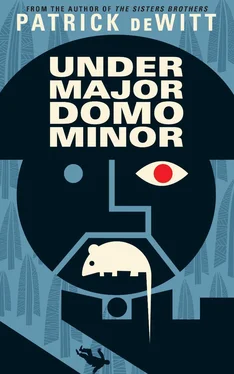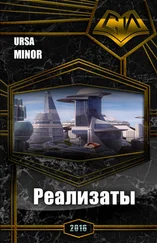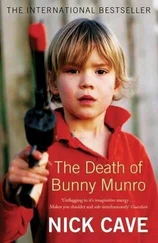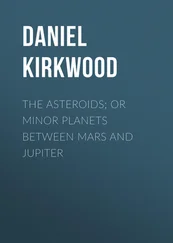“But where do you all come from originally?”
“I don’t know, actually.” He turned to Mewe. “Do you know?”
“Nowhere, I should think.”
A second silence, and Lucy’s attention drifted away, to the face of the mountain looming beyond the castle. At first he was simply reviewing the scenery, but then he realized there was some manner of human industry taking place in the snow: bodies moving about, and puffs of smoke floating along on the air. “Those are people up there,” he commented.
“Ah, yes,” said Memel.
“What are they doing?”
“Wasting their time.”
“Wasting their time doing what?”
“Playing a silly game.”
“And what is the point of the game?”
“To kill but not be killed oneself.”
“Killed?” said Lucy.
“Yes. Did Olderglough not tell you about that either?”
“There was no mention of killing.”
Memel chuckled. “Rascal! Well, not to worry. You aren’t in any danger.”
“No?”
“Very little danger. A small danger. Keep on your toes, and you’ll be fine, I would think. The others are much worse off.”
“What others?”
“The killed, the killing. The rebels and their tyrannical opposition.” He pointed to one side of the mountain, then the other. “They are often out and about.”
“These two parties are at odds, is that what you’re saying?”
“They are at war.”
“Why are they warring?”
“Ah,” said Memel. “Long story.”
“And what is the story?”
“It is most complicated and long.”
“Mightn’t you tell it to me in shorthand?”
“It would never do but to tell it in total.”
All this was troubling to Lucy. “Perhaps you will tell it to me later,” he ventured.
“Perhaps I will,” Memel said. “Though likely not. For in addition to being a long story, it’s also quite dull.”
They had arrived at the edge of the village. Memel and Mewe said their goodbyes, the former taking up Lucy in a lurching embrace which went on far longer than was seemingly necessary. Lucy was embarrassed by the show of affection but made no objection, thinking it likely a local custom, something he decided to endure as an example of his tolerance.
Lucy trudged uphill to stand before the massive riveted doors of the castle, knocking bare-knuckled in the cold. But it was like knocking on the trunk of a tree; it produced a sound so slight that he himself could hardly hear it. He spied a middling-sized bell hung away and to the side of the entrance, and pulled on the dangling rope to ring it; only the rope came away from its pulley, slipping through the air and disappearing with a whisper into the snowbank beside Lucy’s feet. He looked all around, then, for what he couldn’t say, it simply felt an apt time to take in his surroundings. And what did he see? He saw trees and snow and too much space. He upended and sat upon his valise. Reaching for his pipe and tobacco, he found it missing. He thought of Memel embracing him, and he scowled, admitting to himself, “I don’t quite know what to do just now.”
An inventive notion came to him, which was to throw stones at the bell. Rooting about in the snow, he was pleased with himself for thinking of the scheme, or for receiving it; success proved elusive, however, for the stones were hard to come by, the bell was placed very high, and Lucy’s aim was abominable. Now he was panting, and a clammy sweat coated his back. Abandoning the project, he pressed his belly against the castle and peered up. From this angle the facade looked concave, and its height invoked a queasiness, so that he felt his legs might give way, and he would topple backwards down the hill, the thought of which made him laugh. He listened to his own laughter with what might be described as an inquisitive detachment. Much in the same way he had never been able to reconcile the connection between his reflection and his mind, Lucy could not recognize his voice as relating to his person.
He resumed his valise-sitting. Sunlight drew down the front of the castle, bisecting his face levelly, a lovely yellow warmth from the nose-bridge to the apex of his cap, while below there clung a beard of bitter, blue-white chill. He closed his eyes, considering the activity of his own padded heartbeat, the transit of his blood. For a moment Lucy was happy, though he didn’t know why.
When he opened his eyes, a peripheral movement originating from the forest to the east of the castle caught his attention. He turned to witness a sheet of dry snow drop from a tall branch and to the ground, this landing with a soft-clapping shump . Through the aftercloud he saw a man’s famished face emerge from behind the broad trunk of an oak tree. This face held Lucy’s gaze, and Lucy, alarmed, sat upright. A second face, similarly famished, appeared from behind another tree, and Lucy stood. Now a third face came into view, now a fourth, and all at once a group of twelve or more men materialized from the shadowy wood. They were each of them holding a bayonet, and they walked in a huddle towards Lucy, who retreated some steps so that his back pressed flat against the cold wall of the castle.
The men affected a militarily homogeneous air, the lot of them wearing top to bottom grey-green wool, with bands of red encircling their arms at the bicep and black sashes cinched about their waists. As they drew nearer, however, Lucy could see that the cut and style of each man’s outfit was dissimilar to his fellows’: one wore long trousers, another knickers with tall boots; one sported a shearling collar, while his neighbour trailed a scarf. Even their rifles were dissimilar, the lengths of the bayonets varying drastically. It was as though they had each of them made their own garments in the privacy of their homes, with but the vaguest aesthetic prescription to guide them. Only their unshaven, haunted faces were alike.
Lucy was afraid of these men, naturally, for they carried themselves so grimly, and it seemed they intended to set upon him and for all he knew bring him to harm. But when at last they reached him they merely stood there, breathing in and out, and watching him as though he were some part of the scenery. They were looking at him but thinking of their own lives, and not of his.
A man stepped from the rear of the pack, and from the moment Lucy saw him it was clear he was one apart from the others. While the rest possessed the swollen-eyed expression of malnourished desperation, this man’s skull wore the hunger well, and his gaze described intelligence and the most natural manner of confidence. He was, in fact, exceptionally handsome, so that Lucy could not look away from him. The man was perfectly serious as he stepped closer, and when he spoke, his deep voice denoted no hostility, only a measure of import, as though time were a pressing consideration for him.
“What’s your name, boy?”
“Lucy.”
“Lucy?”
“That’s my name, sir, yes.”
“What’s all this with the stones, Lucy?”
“I was trying to strike the bell.”
“And why?”
“I’m eager to gain entrance to the castle.”
“And why?”
“That I might begin my appointment there. Also because I’m cold.”
“I don’t believe I’ve seen you before.” He pointed down the valley. “Do you come from the village?”
“No, I come from Bury.”
“What’s Bury?”
“A location, sir. I come from there.”
The exceptionally handsome man puzzled a moment, as one completing an equation in his mind. “So you are Lucy from Bury, is that what you’re telling me?”
“I am.”
“And you mustn’t tarry, as you’re in a hurry?”
“Yes.”
“Because you’re chilly?”
“I suppose that’s all correct, sir, yes.”
Читать дальше












